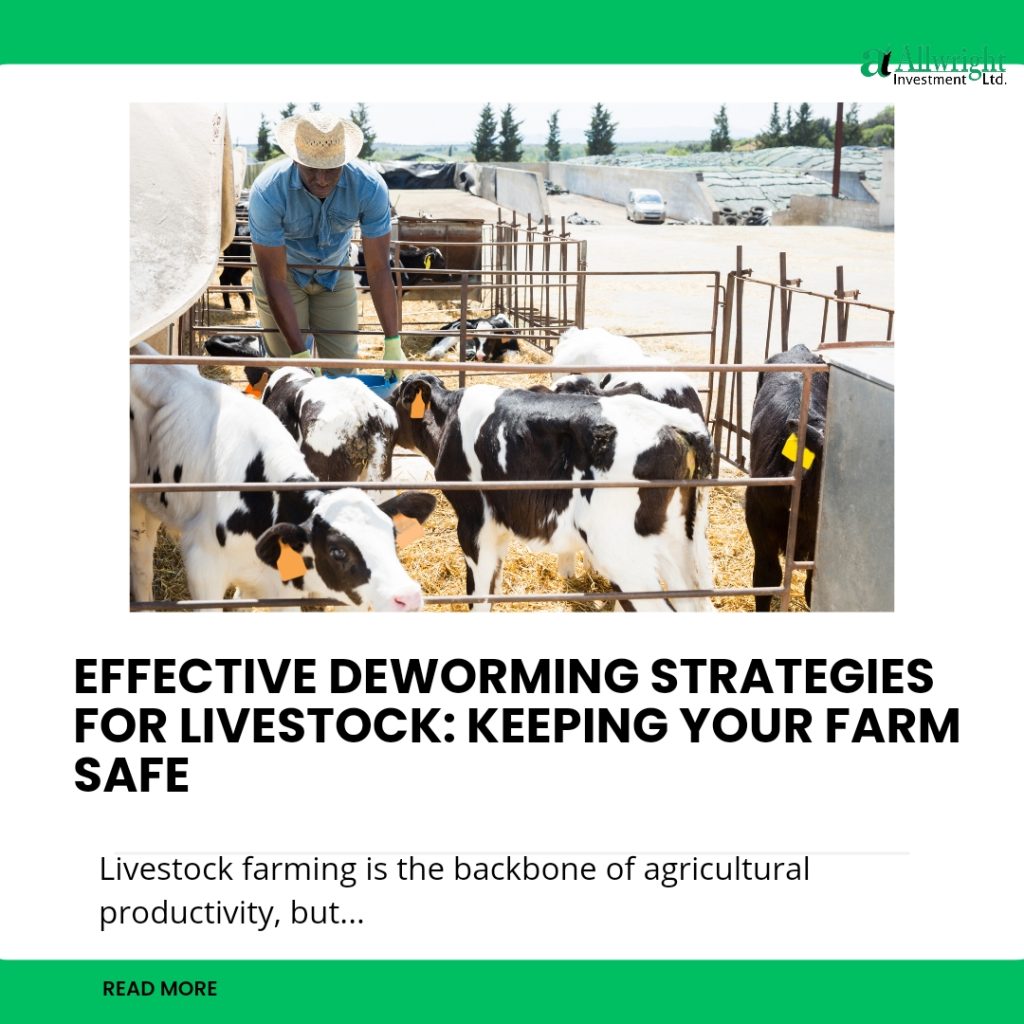
Livestock farming is the backbone of agricultural productivity, but parasites can pose significant challenges, impacting animal health, productivity, and ultimately, your farm’s profitability. Implementing effective deworming strategies ensures healthier livestock, better yields, and a safer farm environment. At Allwright Investment Ltd., we understand the concerns of livestock farmers and provide expert veterinary services, quality medications, and guidance to maintain optimal animal health.
Why Deworming is Necessary for Livestock Health
Parasites such as worms can severely affect livestock, leading to:
- Reduced Productivity: Parasites drain nutrients, causing stunted growth, reduced milk production, and lower weight gain.
- Disease Transmission: Some parasites can carry diseases, putting your livestock at further risk.
- High Mortality Rates: Left untreated, severe infestations can lead to death, especially in young animals.
- Economic Losses: Reduced productivity and increased veterinary costs affect your bottom line.
By addressing these issues, an effective deworming program can safeguard your farm’s operations.
Strategies for Effective Deworming
Here are proven strategies to keep your livestock free of parasites:
1. Develop a Deworming Schedule
Creating a regular deworming schedule tailored to your farm’s needs is essential. Factors to consider include:
Livestock type and age.
Local climate and parasite prevalence.
Veterinarian recommendations based on your farm’s history.
2. Use the Right Deworming Products
Not all dewormers work on every parasite. Choosing the right product for your livestock is critical. For example:
Cattle: Focus on products effective against roundworms and liver flukes.
Poultry: Opt for safe, poultry-specific dewormers.
Goats and Sheep: Target parasites like barber pole worms.
3. Rotate Dewormers to Prevent Resistance
Parasites can develop resistance to deworming medications if overused. Rotating active ingredients in your dewormers ensures long-term efficacy.
4. Practice Good Farm Management
A clean and well-managed farm reduces the chances of parasite infestations:
- Regularly clean feeding areas and water troughs.
- Avoid overgrazing to minimize contact with parasite eggs in the soil.
- Isolate and treat new animals before introducing them to your herd.
5. Conduct Regular Parasite Monitoring
Routine fecal testing helps detect the presence of parasites and assess the effectiveness of your deworming program.
6. Consult with Veterinary Experts
Veterinarians provide tailored advice and ensure your deworming program aligns with best practices. At Allwright Investment Ltd., our veterinary services include expert consultations to address your livestock health concerns.
Effective deworming is the foundation of healthy, productive livestock. At Allwright Investment Ltd., we combine top-notch veterinary services, high-quality medications, and expert advice to ensure your livestock thrive. Whether you’re a seasoned farmer or just starting, we’re here to support your journey.
Ready to take the first step toward parasite-free livestock? Contact us today for expert consultations, quality products, and comprehensive farm services. Let’s keep your farm safe and productive!
Invest in Allwright Investment Limited today!

Leave a comment
You must be logged in to post a comment.